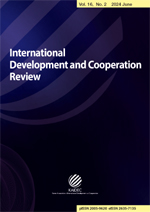- 영문명
- Empirical Assessment of ODA Grant Funding for Start-ups in Conflict-Affected Regions: Evidence from Palestine
- 발행기관
- 국제개발협력학회
- 저자명
- 신유승(Youseung Shin)
- 간행물 정보
- 『국제개발협력연구』제17권 제3호, 43~58쪽, 전체 16쪽
- 주제분류
- 사회과학 > 정책학
- 파일형태
- 발행일자
- 2025.09.30

국문 초록
연구목적: 본 연구는 분쟁이라는 특수한 환경에서 스타트업 지원형 ODA 사업 이 현지 기업의 성장과 지속가능성에 미치는 영향을 실증적으로 평가한다. 구 체적으로 한국국제협력단(KOICA)의 팔레스타인 스타트업 보조금 지원 사례 를 중심으로 단기 및 장기적 성과를 평가하였다.
연구의 중요성: 최근 민관협력을 통한 창업지원형 ODA가 확대되고 있으나, 분쟁취약국에서 현지 스타트업에 직접 보조금을 지원한 사업의 정량적 실증 연구는 거의 보고되지 않았다. 본 연구는 KOICA 팔레스타인 사업에 대한 정량 적 평가를 시도하여, 유사 사업의 설계와 평가에 중요한 학술적, 정책적 시사점 을 제공한다.
연구방법론: 변화이론(Theory of Change)을 활용해 사례연구 대상 사업의 개 입 논리를 재구성하고, 보조금을 지원받은 팔레스타인 스타트업 34개사를 대상 으로 보조금 지급 전후 3년간 매출, 고용, 생존율 데이터를 종단적으로 수집하 였다. 이를 기반으로 사례기술적(idiographic) 접근을 적용하여 성과와 한계를 도출하였다.
연구결과: 보조금 지급 직후 단기적으로 매출과 고용이 증가했으나, 장기적인 지속가능성은 제한적이었다. 수혜 기업의 59%가 3년 내 폐업했으며, 생존 기업 (41%)은 보조금이 촉매로 작용해 3년간 평균 매출이 82% 증가한 반면, 폐업 기업(59%)은 동기간 매출이 45% 감소하며 극명한 양극화를 보였다. 특히 폐업 기업은 보조금으로 인한 일시적 고용 급증 후 급격한 매출 감소를 겪었다.
결론 및 시사점: 창업지원형 ODA 사업은 단기적 성과에는 효과적이었으나, 장기적 지속가능성 확보에는 한계가 있었다. 팔레스타인과 같은 분쟁취약국에 서는 무상 보조금이 단기 유동성 공급에 그쳐 사업 종료 후 높은 폐업률로 이어졌다. 따라서 분쟁취약국에서의 유사한 지원을 고려할 때에는 단순 무상 원조 방식을 넘어, 성과와 연동된 상환 의무를 부과하는 ‘성과 기반 상환형 보조금(performance-based repayable grants)’을 도입하여 기업의 책임성을 담보 하고 장기적 생존을 유도해야 한다.
영문 초록
Purpose: This study empirically evaluates the impact of entrepreneurship-focused ODA projects on the growth and sustainability of local start-ups operating in conflict-affected settings. Specifically, it analyzes the short- and long-term outcomes of KOICA’s grant-funding program for Palestinian start-ups.
Originality: Although entrepreneurship-oriented ODA initiatives and public-private partnership programs have expanded, quantitative empirical research on direct grant support for start-ups in fragile and conflict-affected regions remains scarce. This study presents the first longitudinal, quantitative evaluation of KOICA’s Palestinian start-up grant project, providing important academic and policy insights for the design and assessment of similar programs.
Methodology: Using the Theory of Change (ToC) framework, this study reconstructs the project’s intervention logic and conducts a near-census, idiographic case analysis of 34 grant-recipient start-ups. Revenue, employment, and survival data were collected longitudinally over a three-year period before and after the grants were awarded, enabling a systematic assessment of outcomes and limitations.
Result: Grant funding led to a short-term increase in revenue and employment; however, long-term sustainability was limited. A stark polarization emerged: while 59% of recipient firms closed within three years, the surviving firms (41%) saw their average revenue grow by 82% over the three years, suggesting the grant acted as a catalyst. In contrast, closed firms experienced a 45% revenue decrease over the same period. Firms that eventually closed typically showed a temporary spike in employment immediately after receiving grants, followed by steep revenue declines.
Conclusions and Implication: Entrepreneurship-focused ODA projects are effective in delivering short-term outcomes but face clear limitations in achieving long-term sustainability. In fragile contexts like Palestine, unconditional grants primarily provide temporary liquidity, leading to high post-project closure rates. Therefore, future project designs should move beyond simple grants and incorporate performance-based repayable grants, which link financial support to a repayment obligation based on performance, to enhance accountability and foster more durable growth.
목차
I. 서론
II. 연구 설계 및 분석틀
III. 연구 방법론 및 데이터
IV. 분석결과
V. 해석 및 논의
VI. 결론
References
키워드
해당간행물 수록 논문
참고문헌
최근 이용한 논문
교보eBook 첫 방문을 환영 합니다!

신규가입 혜택 지급이 완료 되었습니다.
바로 사용 가능한 교보e캐시 1,000원 (유효기간 7일)
지금 바로 교보eBook의 다양한 콘텐츠를 이용해 보세요!


